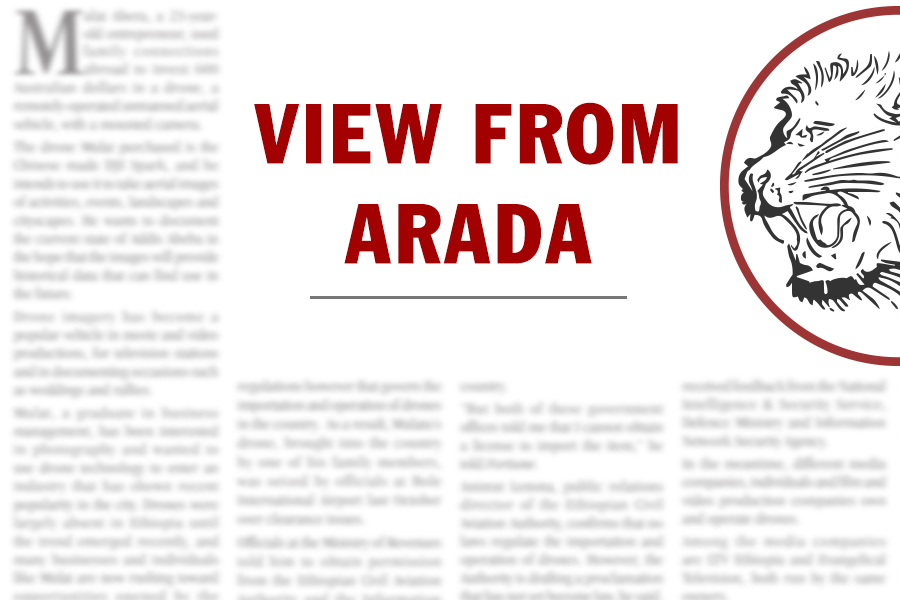
A bill that prohibits private universities and colleges from renewing course licences where a quarter of their students fail to achieve the passing mark upon taking exit examinations is put forth by the Federal Education & Training Authority.
It comes following the unprecedented results where less than one-fifth of examinees from private institutions scored a passing mark during the exit examination introduced this year.
The bill stipulates a rigorous list of standards for new accreditations and license renewal, including a minimum library space of 1.5sqm per student along with passing rate demarcations.
Exit examinations for all programs became part of the requirement for obtaining an undergraduate degree this year, with a mere 40pc of students passing from 150,000 examinees. The numbers were rather a dramatic reveal for private higher education facilities, with 83pc of their students failing to obtain the 50pc passing mark.
Cherugeta Genene, inspection & authentication deputy head at the Authority, said the standard is crucial for safeguarding the quality of higher education as evidenced by the recent exam results.
He disclosed that the requirement for renewal would have been passing half the students, but almost all will fall below that mark.
The necessity of a robust regulatory framework for higher education was indicated as crucial for creating job-ready graduates by Cherugeta who explained that the draft will incentivise the schools to make sure that their students meet the basic criteria for obtaining a degree.
"Students are graduating without a shred of knowledge," he told Fortune.
The Authority, which oversees the accreditation of over 320 private colleges and universities in the country, has declined renewals for 1,000 courses across 50 institutions due to their acceptance of students beyond capacity.
Private institution managements encourage the reorientation of educational policy towards quality.
Rift Valley University has a little over 30pc of its 12,000 students that have taken the exit exam pass this year, which is almost twice the national average. It of the largest private higher education facilities with over 18 campuses across regional states.
Abebe Gemechu (PhD), president of the University, observes elevated regard for exams which should not be the sole indicator of competence.
"It takes more than exams to test core competence," he told Fortune.
He fears that current students are a product of faulty educational upbringing while recommending the Ministry of Education raise its own regulatory capacity as part of its effort to improve higher education standards in the country.
"I have hopes for the next generation," he said.
Despite the Ethiopian government spending nearly half of its education budget on higher education throughout the years, the focus had been primarily given to the expansion of facilities rather than quality.
A paper submitted to the University of Western Cape indicates that the access versus quality conundrum has plagued Ethiopia's higher education landscape throughout its history, much like other African countries. Ethiopia currently has 55 state-owned universities and 324 private colleges.
Barata Folla, Registrar Head and lecturer at Africa Beza College expresses a mixed attitude towards the new directive.
"Everything seems to be a little rushed," he told Fortune.
While Berata acknowledges the necessity of reform in higher education, he fears that the imposition of stringent conditions on the newly ushered examination could undermine the effectiveness of the sweeping changes. He disclosed that a similar opinion is held by the academic and non-academic staff at the eighteen-year-old private college.
"Structural change is effective through a gradual process," he said.
Barata indicated that the examinations should be drafted in concurrence with the education the students received, noting the difficulty of exams in accounting departments this year.
As part of the sweeping reforms championed by former opposition political leader and current Minister of Education Birahnu Nega (Prof), university entrance exams prepared under a new format for close to a million students had unprecedented results, with a mere 3.3pc managing to pass at the start of the year.
The Ministry revealed the prior week that qualifications for entry into postgraduate studies would be harmonised by nationwide exams administered in a structured manner.
Education experts express endorsement for the unfolding reforms by the Ministry.
"This should serve as an alarm," says Alemayehu Tekelemariam (PhD), a researcher and lecturer on education for three decades. The researcher considers the 25pc quota put forth by the Authorities as a rather generous stipulation in lieu of the massive numbers that have failed to obtain passive marks.
Alemayehu argues that the colleges should have taken the initiative themselves to increase the number of students who pass exit exams, with the 17pc pass rate instigating a reflection.
He noted that higher education is meant to create a skilled, knowledgeable and competent labour force instead of mass production, and recommended that pass rate quotas be extended to state-owned universities.
"The libraries have been full since the entrance exam results," he told Fortune in a jovial tone.
PUBLISHED ON
Aug 05,2023 [ VOL
24 , NO
1214]

Radar | Nov 26,2022

Fortune News | Oct 08,2022

Commentaries | Jul 19,2025

Fortune News | Feb 27,2021

Fortune News | Feb 29,2020

Dec 22 , 2024 . By TIZITA SHEWAFERAW
Charged with transforming colossal state-owned enterprises into modern and competitiv...

Aug 18 , 2024 . By AKSAH ITALO
Although predictable Yonas Zerihun's job in the ride-hailing service is not immune to...

Jul 28 , 2024 . By TIZITA SHEWAFERAW
Unhabitual, perhaps too many, Samuel Gebreyohannes, 38, used to occasionally enjoy a couple of beers at breakfast. However, he recently swit...

Jul 13 , 2024 . By AKSAH ITALO
Investors who rely on tractors, trucks, and field vehicles for commuting, transporting commodities, and f...

Oct 25 , 2025
The regulatory machinery is on overdrive. In only two years, no fewer than 35 new pro...

Oct 18 , 2025
The political establishment, notably the ruling party and its top brass, has become p...

Oct 11 , 2025
Ladislas Farago, a roving Associated Press (AP) correspondent, arrived in Ethiopia in...

Oct 4 , 2025
Eyob Tekalegn (PhD) had been in the Governor's chair for only weeks when, on Septembe...